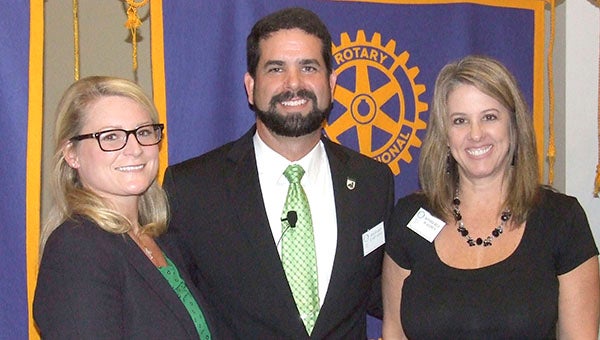Bainbridge State College talks growth at Rotary
Published 4:29 pm Tuesday, September 1, 2015

Bainbridge State College President, Richard Carvajal, gave the program at Tuesday’s Rotary meeting, after an introduction from the college’s Lauren Harrell, left. The meeting was led by Rotary past-president, Kim Walden, on the right. — Carolyn Iamon
Bainbridge State College has had a busy year of growth and change, according to the annual update given by President Richard Carvajal at Tuesday’s Rotary meeting.
He began by describing the first Founders Day held at the college last week. It is established in memory of Founding President Dr. Ed Mobley and will be an annual event during the first week of the Fall Semester each year.
From there he addressed how the college had made a choice earlier to strengthen their standards, especially in the Financial Aid Department, knowing it would result in lower enrollment.
“But, it was the right thing to do,” said Carvajal. He went on to explain the projected headcount has stabilized, with total fall enrollment up 1.5 percent and for the new entering class it is up 20 percent.
Some of the plans in the college “playbook” that have assisted the growth are: expanded evening and weekend classes; offering in-state tuition to Alabama and Florida residents; creating new partnerships with businesses, thereby creating more job opportunities for students.
This year the college has launched its first bachelor degree program. Its first Agri-business program is expected to be up and running by Spring 2016. A full-time instructor of Agriculture has been hired and is in the process of building that program.
Two main issues have impacted enrollment.
First is the establishment of GAP Scholarships. Private funds have been matched and funds focused on non-traditional students. These would be students who did not enroll in college directly from high school. This group understandably has fears, especially about affording the education and navigating the confusing student aid process.
Under the GAP program their tuition for the first six hours (one semester) is paid, giving them time to learn their way through the processes.
The second issue is the Move on when Ready Law (SB 132 passed, July 1, 2015). It consolidates three separate existing programs into one, making it easier for students grades nine through 12, who demonstrate they are college ready, to take college courses at BSC while enrolled in high school and even get dual credit. It covers funding up to 15 hours per semester for tuition, most fees and books. Students may take up to three semesters per year and does not count against the HOPE caps in funding. Also, the high school doesn’t lose funding and may even apply for transportation grants to transfer the students to the college campus.
Carvajal said multiple high school busses come regularly to BSC campus.Through this program, it is possible that a student could obtain a high school diploma at the same time as he acquires a two-year associate degree. This saves time and is a significant financial savings for parents.
New construction is nearing completion at the Hawthorn Health Sciences Center that will be used for nursing students and the Seminole County Learning Center will be open for use in January 2016.
Carvajal said he is frequently asked about adding athletics and student housing. He can’t answer either question at this time.
Questions from the audience addressed the matter of consolidation of colleges and if that is in the BSC future. The answer was that there is no knowledge of imminent consolidation for BSC. However, there is a good side as well as bad to it. There is loss of identification, but it can be positive for the students as they are given access to new four-year degrees.
A concern was raised by a member of the audience about the dual enrollment program being implemented when the student may not be mature enough to know what they want to do when they move on to the four year college right out of high school. Carvajal agreed that was a very legitimate concern and they were taking steps with counselors, etc., to address it.





